Yul Moldauer realizes his Olympic ambition with strategy and attitude | By Martha Vickery (Summer 2021 issue)
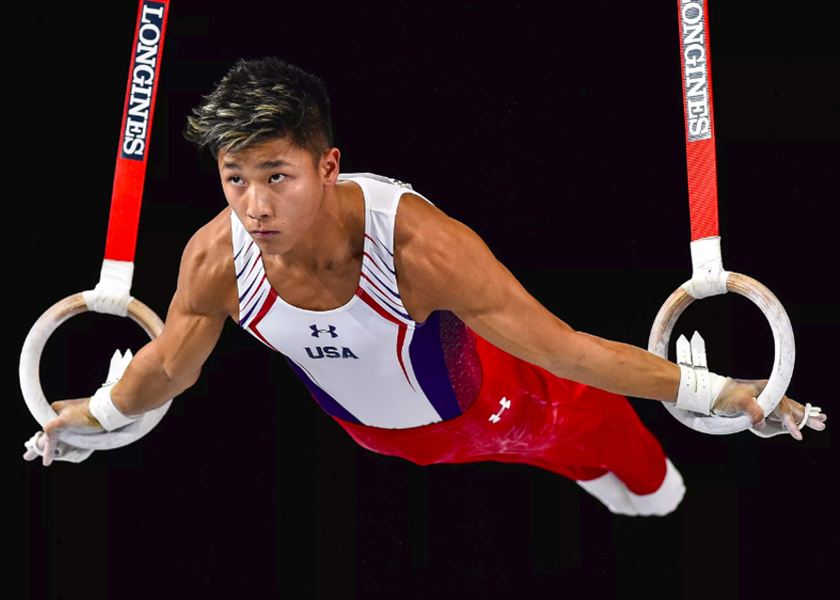
“The 24-year-old was the only national title winner not named Mikulak between 2013 and this year,” one story declared, referring to Moldauer’s USA Olympic teammate Sam Mikulak, who with Brody Malone and Shane Wiskus competed this summer in the (late) 2020 Tokyo Olympics.
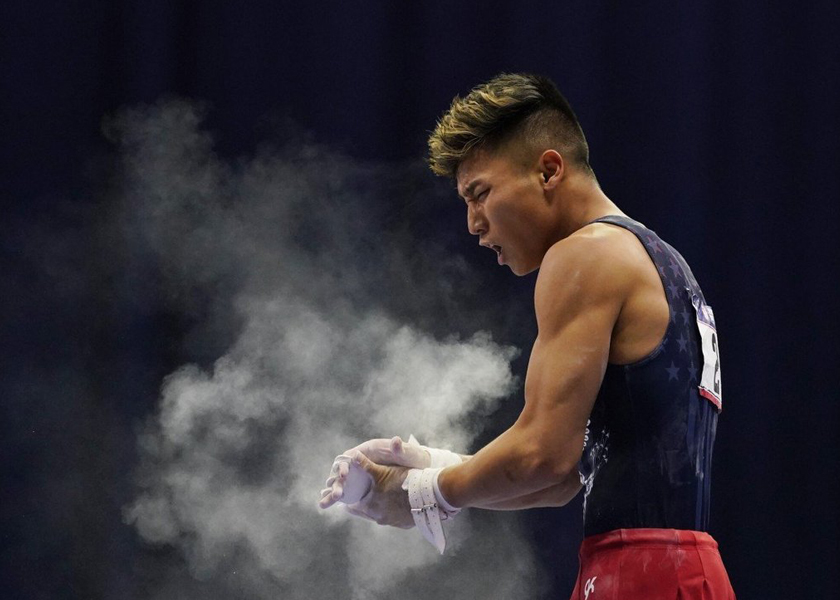
The one-year-late Olympics means the Paris 2024 summer Olympic Games are only three years away, instead of four, a fact that Moldauer considers with optimism now that the Tokyo Games are in the rear-view mirror.
Starting gymnastics at age seven, because his parents wanted a way for him to channel his abundant energy, Moldauer, a Korean adoptee, soon became a child gymnast. Then, he became a teen rising star in the sport. At age 16, he advanced to the U.S. Junior National team and got gold at the 2013 International Junior Mexican Cup.
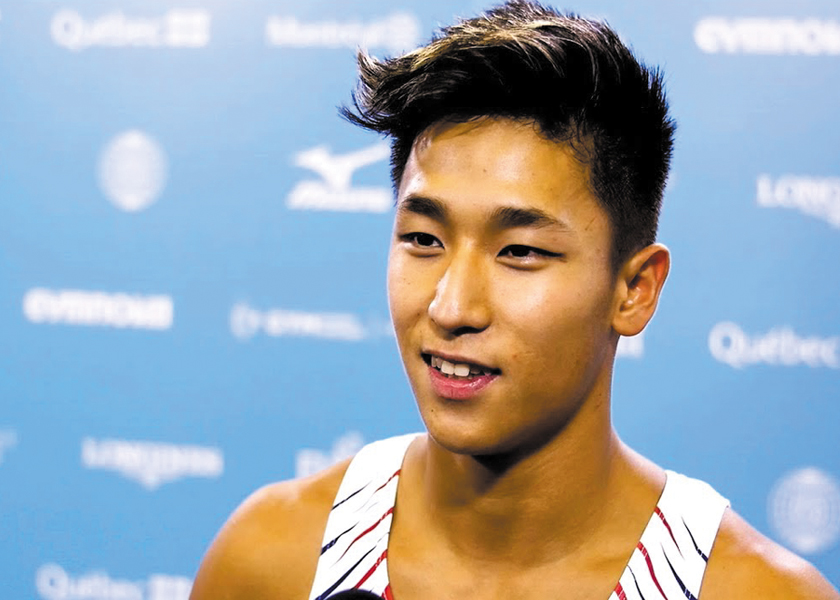
At the University of Oklahoma, which has a top-ranked gymnastics program, he won the All-Around category at the National College Athletics Association (NCAA) Championships as a freshman. After that, he led Oklahoma to three straight national team titles and earned seven individual titles. In 2017, he took the U.S. Championships by winning the all-around title, and was a bronze medalist in the floor exercise.
In June 2021, he got the second-best overall score at the U.S. Olympic Gymnastics Team Trials, which automatically put him on the team.
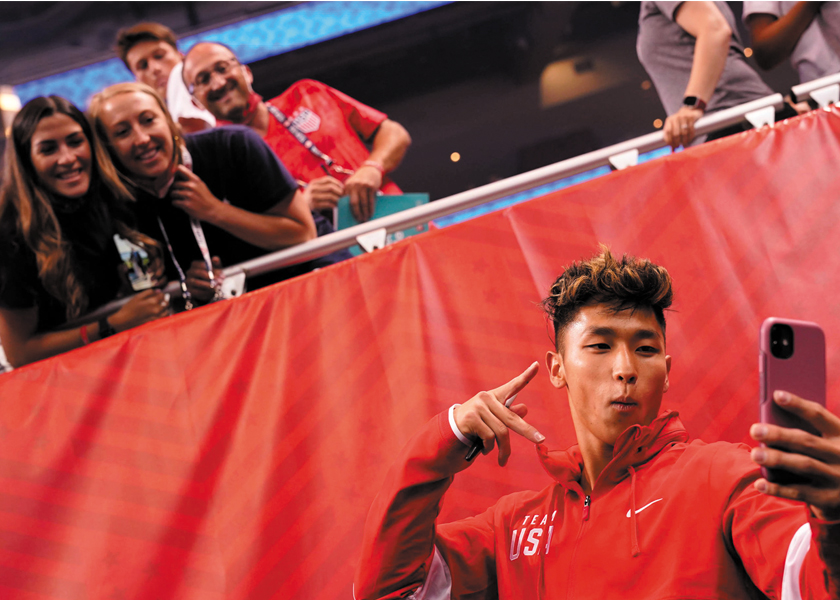
The show-off
The NBC Sports videos of Moldauer’s June Olympic Trials are a fun watch. Moldauer is all showmanship after each event, letting off a roar and a few claps and fist pumps, releasing clouds of chalk dust into the air. “He is a sticking machine,” one of the commentators says of his consistent ability to land a jump solidly on both feet. “Oh, come on!” the other commentator yells in disbelief as Moldauer soars over the vault, and flawlessly sticks the landing facing backwards.
“You are a madman, dude,” his teammate Sam Mikulak tells him, while high-fiving after Moldauer aces his elaborate and difficult ring routine.
Mikulak had to be talking about his teammate’s showmanship, not his personality. In a career that has a short window of time, going from International Junior champion to Olympic Trials in eight years is not a madman’s pace in the scheme of things. It is more like an uphill journey for this persistent and talented athlete who is now at the top of his career.
The men’s team acquitted itself excellently, although it did not return from the Tokyo Olympics with a medal. The team came in fifth; Russia (or Russian Olympic Committee (ROC) as it is referred to in the scorecards) got gold, Japan silver, and China bronze. Within about a point in the overall score were Great Britain fourth, and U.S. fifth. Moldauer contributed the second-highest overall point score for the U.S. men behind Mikulak.
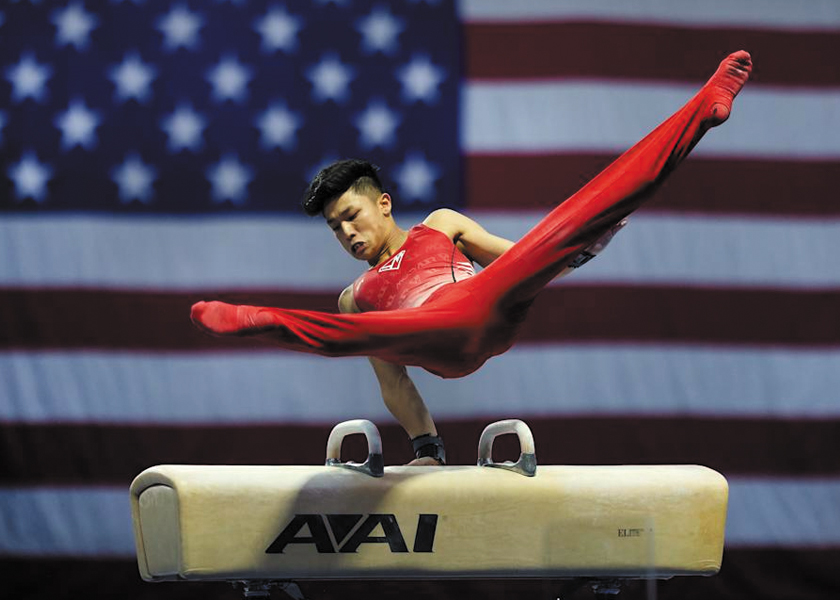
The hard worker
In conversation, Moldauer is a rather serious and soft-spoken type, quite different than his stage persona. He describes his life in terms of personal best, and games of inches, the reality he has inhabited as a high school and college top-ranked athlete. During the six years between age 18 and the July Olympic games, his energy has been focused on getting himself to the Tokyo Olympics.
People always said to him ‘you could go far in this sport,’ he said, but it took awhile to see it on the horizon. “When I was about 10, I watched my teammate Alexander Artemev compete in the Olympics where they won a bronze medal, and I remember …saying to myself that I wanted to do that one day.” At age 18, he said, it began to look like it could happen.
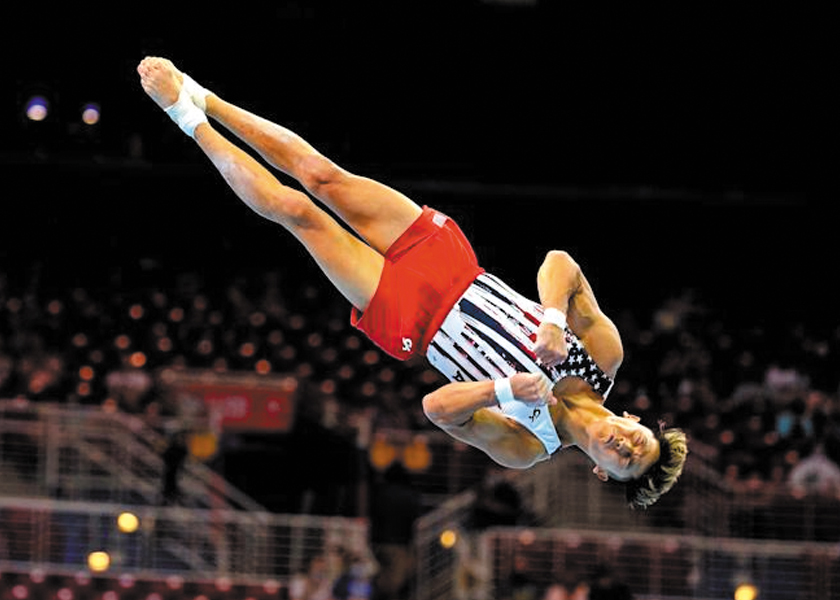
In 2016, Moldauer went to the Olympic trials as a sophomore in college, probably the youngest contestant there, he guessed. That experience reinforced his dream. “I remember telling myself that I wanted to be a person actually contending to be on the team, not just a kid trying to get the experience.”
And then, he said, “there’s a certain time period where you figure you really need to work hard. You think ‘this is my chance. I’m going to do everything I can.’” That happened in the last couple years leading up to the Tokyo Olympics. But there were bumps and swerves along the road to get there.
Embrace the grind
Moldauer’s favorite expression is “Embrace the grind.” That says a lot about the reality of being at the top of a sport. There is fun teamwork involved, and moments of excitement. There are also plenty of long days of grinding away at strength training, cardio training, and practicing the same move over and over again. There are exciting things going on – activities with friends, events, staying out late — that athletes have to pass up. The work becomes too demanding to spend time on other things. In addition to workouts, sleep, food, hydration, and rehabbing the body from small injuries are all part of the workload.
“We have no off season,” Moldauer said. “Summer can be even more difficult than the competition season. You are conditioning more, you are trying new skills, you have to keep your endurance up. It is like playing a chess game. What move are you going to take to win this game?”
Gymnastics in the time of pandemic
As soon as he heard the gyms would shut down, Moldauer was texting his coach at the University of Oklahoma. “I asked if I could grab some stuff from the gym — a set of weights and some parallettes [portable parallel bars used for training],” he said, “and I said by the way, I need a [pommel] horse in my garage – just jokingly.” His coach was also doing some creative problem solving. “A couple days later, he texted and said ‘I know a guy willing to loan you a horse for your garage.’”
For three or four months, Moldauer trained full time in his garage. “It got pretty cool. I got some eye hooks and screwed them into the ceiling, put in a set of rings so I could do ring strength.” At the same time, he said, the Air Track company sent him an inflatable gymnastics tumbling strip, and he set up a tumbling run on his front lawn. A video company, Sideline Scout, “actually came to my house and let us use their video replay system” so he could watch his form on video.
He moved permanently from Oklahoma to Denver and joined the 5280 Gym in Wheatridge, Colorado. Being at home helped a lot over the past year. He worked on his routines without distractions.
After he got back into the gym, he said, “there were times the schedule was super-hard, because of all the time I took off. They say if you take one day off in gymnastics, it takes two days to get back,” he said, which he found to be true. “I had to change gyms, change coaches, move states, so it was a pretty packed year for me.”
There were certain things he could practice in his garage gym, but many things he could not do. Doing moves on a portable inflatable mat was one of those things. The air mat won’t hurt your body like a hard floor, so it can be a useful tool, he said, “but going onto a real hard surface and doing handsprings is a lot different, and a lot different on your joints.” Back on the gymnastics floor, he said “I felt like I was playing catch-up, and I was sore all the time, at some points I had minor little injuries, that I knew was just part of the training.”
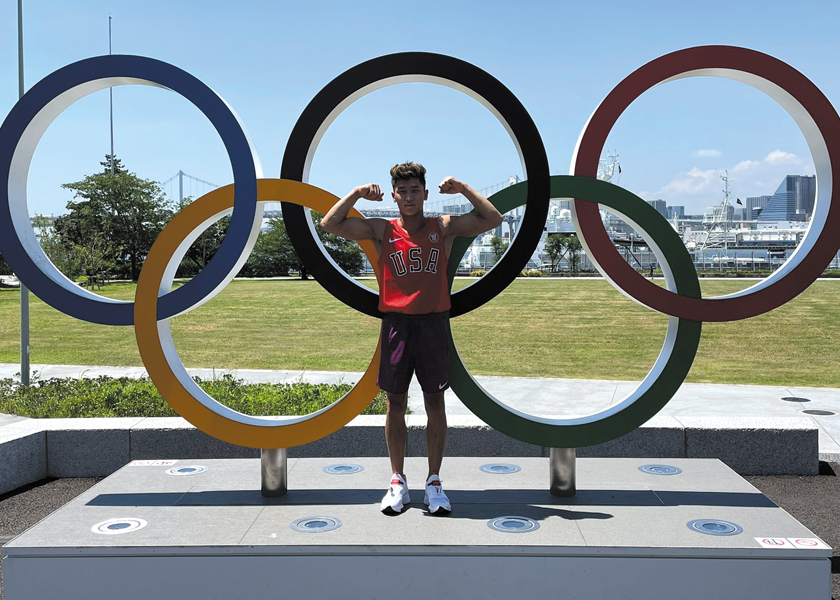
The trial of a lifetime
Crunch time was the Olympic trials in June. “I think the Olympic trials can in some sense be harder than the Olympics themselves,” he said. It is a make-it-or-break-it moment for every gymnast – a few will make the team, and the rest will not. “There are no second chances,” he said, and not getting on the team could mean waiting another four years. Depending on the gymnast’s age, that competition may be the last Olympic trial they ever do.
At the Olympics, he said, “you’re stressed and nervous, but it is a different type.” The big difference – you are actually at the Olympics, he said. “It was a huge honor to represent the country at the Olympics and it was a huge honor to be on the team,” he said. He felt a lot of joy and wonder, and all the restrictions and protocols did not dent his mood at all, he said.
The self-talk
Moldauer talks a lot like a coach. He is his own coach in his head, he said, but his teammates often tell him he talks coach language, he said. “When I am in the gym, I give my teammates corrections and ask them how they are feeling. And I try to feel what they’re feeling, and try to give my sense of their words to help them,” he said, “so I guess I am kind of like a coach, but I just want to be a good teammate who helps their teammates get better.”
His self-talk about getting to the Olympics went something like this: “You can’t let the distractions overwhelm you,” he said. “You can’t let the name of the competition get to your head. At the end of the day, whether it is world championships, the Olympic Games or just another home meet, you gotta go in there with a purpose. The more you go to every meet with a purpose, instead of just for the competition name, that’s when you start doing a lot better as a
competitor.”
Moldauer makes sure he is ready, he said, and then he lets the distractions just fall away. When he got ready to go to Tokyo, well-meaning people peppered him with questions like “Are you nervous?” and “It’s your one chance in four years,” he recalled, “and for me it doesn’t matter. As an athlete you are always going to have to go through situations that are unusual, and situations that you have to rise to.” It’s all part of being a competitor. “At the end of the day, that’s who I want to be, that athlete that looks at a competition and is not afraid. I want to be an athlete that takes on what other people might be scared of, and see it in a different perspective.
“Yeah, I know the games come only every four years. Everyone hears that at every Olympic games. But why focus on that? You’ve worked for years, probably the hardest you ever worked, so this is the time to show it off.”
Ignoring the negatives
Moldauer said his philosophy for any competition is to “put on a show.” Why not enjoy it? “You know, you train seven hours a day. I often wake up sore. I have to follow a diet. I have to separate myself from decisions that take me away, like skiing or maybe it’s not a good idea to go hang out with my friends this weekend. I have to make these crucial decisions because of my sport, and this is my time to show off how hard I work, and all the effort I’ve put in, so I never
focus on the negative stuff.”
There were many negatives to deal with at the Olympics, and in terms of the year leading up to the Olympics, for all of the athletes. People talked about it having to stay in their rooms all the time they were not at practice or at some other required activity. They talked about having to take a COVID test every 12 hours.
Moldauer said he just blew it off. In self-talk style, he said “Yes, there are going to be protocols, yes, there are going to be circumstances not usual to the normal Olympic games, but you’re going, and that should be enough for anything that comes your way. …I just told myself ‘look this is the Olympic games. I don’t care what I have to do. This is my time to show the world why I’m here.’”
The team moved around as a self-contained pod. “We couldn’t do a lot. That’s why it was nice to have great teammates there. We really entertained each other. …We would all Facetime or snapchat or play video games in one room, so we wouldn’t be bored.”
Moldauer is into the showmanship of being in front of a big stadium crowd. Not having that experience at the biggest event of his life could have been a disappointment. “It wasn’t disappointing!” he insisted. “I just accepted it! It motivated me for Paris. I want to make the [2024] Paris team so hopefully by then everything will be normal and we’ll get to really enjoy the Olympics. It’s just three years,” he said, “which is good.”
The new focus on mental health
Olympic tennis player Naomi Osaka refused the press conferences, and then stepped out of the Olympic trials in the spring citing a need to protect her mental health. After that, gymnast Simone Biles stepped aside in mid-competition, saying she was not mentally prepared to compete. Both of these incidents caused public reaction across the spectrum, from vilification to total support.
Moldauer said he felt his duty was to try to understand the position of the athletes, and support them. He felt special empathy for Biles. “Simone has done so much for the United States and gymnastics, and it surprised me to see all the hard comments about her just because she pulled out.” The pressure of comments about her on social media, the pressure of preparation, the extra year of waiting for the Games, the long and lonely hours in the gym – she was facing it all at the same time. “Just, as a normal person, these past two years have sucked mentally for everyone. It has been draining. Imagine what Simone has been going through on top of what everyone else has been dealing with?” he said.
In fact, her awareness about her own mental state may have upped the team’s chances too, he said. “What if Simone went in and fell a couple more times? I don’t think they would have been on the podium.”
As for the fickle beast of social media, Moldauer said he lives with it, and frequently ignores it, for his own mental health reasons. “People can be so nice on there, and in one second, they can be so mean. If I get a rude comment, I don’t even look at it. If people are going to think that way, they’re just going to do it. But I am not going to put anything into this negative energy. I’m just going to keep doing my thing. People can say whatever they want, but the real followers will always follow me.”
The adoptee perspective
As a Korean adoptee, Moldauer said, he thinks often about where he ended up, and stereotype of the driven, achieving Type A Korean adoptee. He’s not sure exactly what drives him, but “yes, I think what helps motivate me is about my parents, and that they gave me a second chance in life.” He wonders sometimes what would have happened if he would have been adopted by a different family, one that didn’t raise him to be an independent thinker or weren’t supportive of him following his dream. “It plays a role in the fun I have in this sport. I know that if I was not adopted or if I was not adopted in the right family, maybe would not be doing gymnastics at all.” A diverse group of athletes got on the teams of various countries for the 2020 Olympics, Moldauer said, which was validating. “You don’t have to look a certain way to represent a country,” he said. Countries are showing by the athletes they are sending that they are sending the people they want to do the job.
Moldauer’s family, and his entire gym got up at 4 a.m. to watch the USA men compete. The Olympics channel showed it all in real time. His phone started blowing up with photos and snapchats. It reminded him, he said, that in gymnastics “you can never say you did anything alone. When you take a step back, you can see all the people that helped you.” Moldauer thinks his own example to model is not the typical athlete who gets to the Olympics, but the unlikely one. “I hope it shows anyone who has a dream, but who feels that they can’t do it because they come from somewhere , or look some way – that none of that is true. You have to take on the journey, and embrace the grind, and work hard, and you never know – your dreams might come true.”
For the next three years, Moldauer will be in his hometown of Arvada, Colorado, embracing the grind at 5280 Gymnastics. His goal will be to ace the Olympic trials a second time, and make the Paris team, hopefully with some of the same 2020 teammates, but it could be a different group. The team talked about their goals after Tokyo – they’re in it to win it. “The younger guys on the team are really motivated to get the team on the podium this next quad,” he said. “We want to be contenders. We don’t want to be fourth or fifth place, and we talked about what we have to do
and I think we are all really determined to be there.”
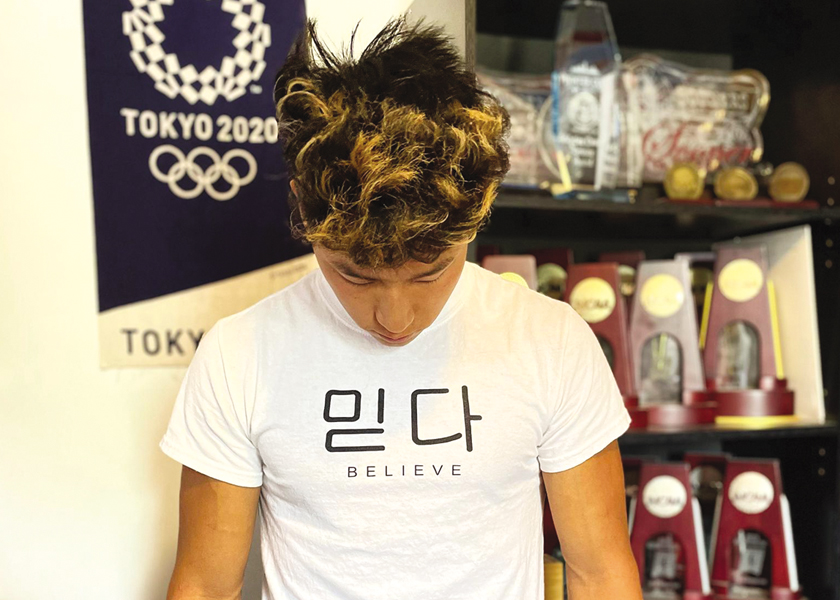
Yul Moldauer has his own website (complete with crowd roars) at: yulmoldauer.com


